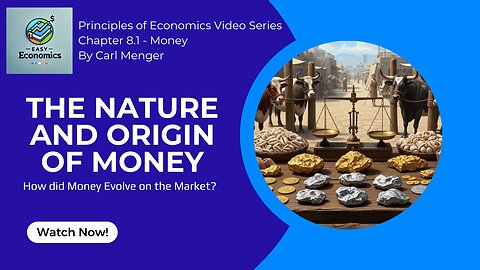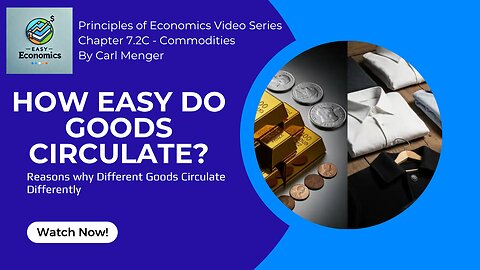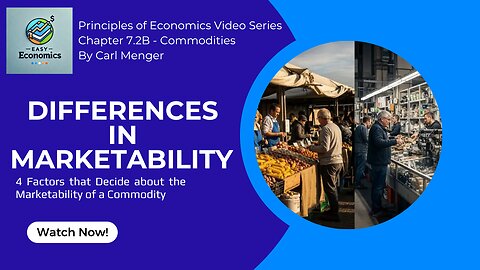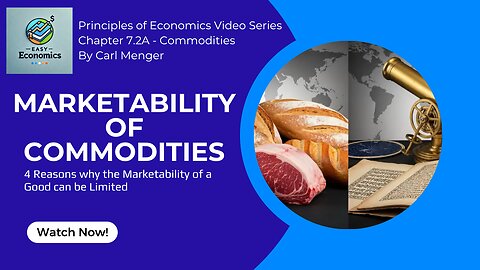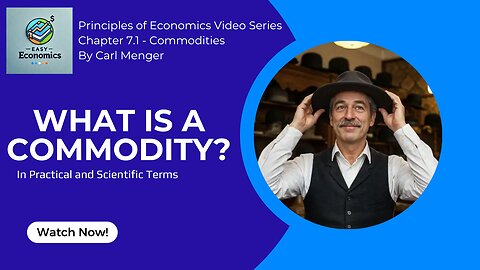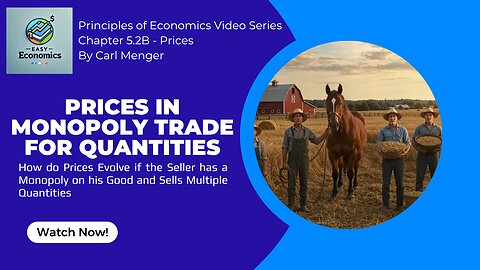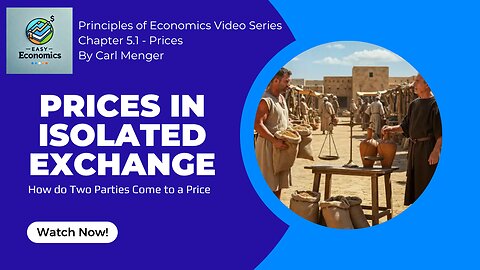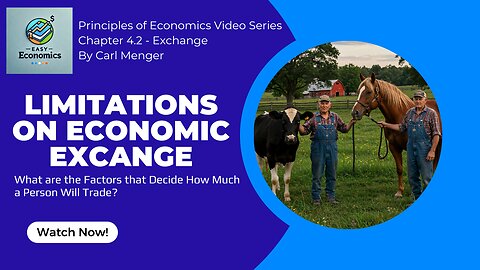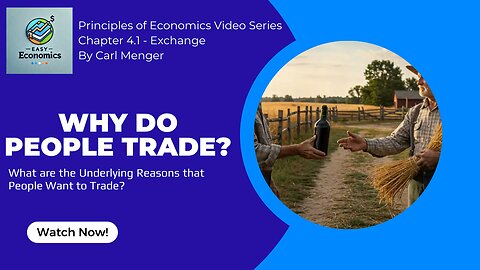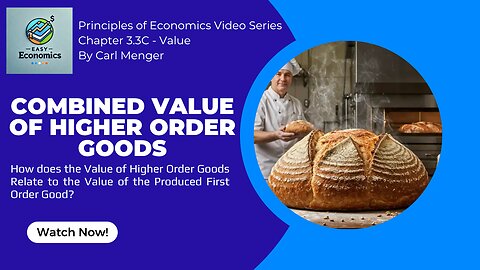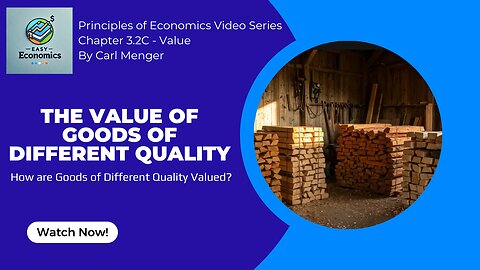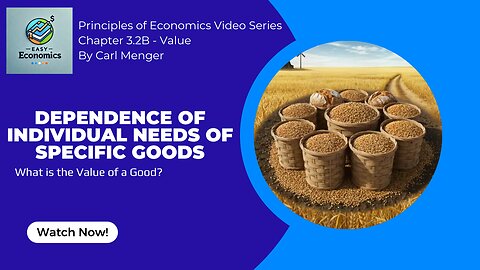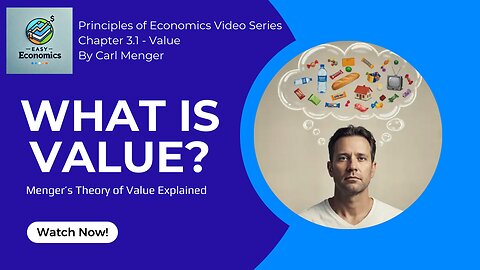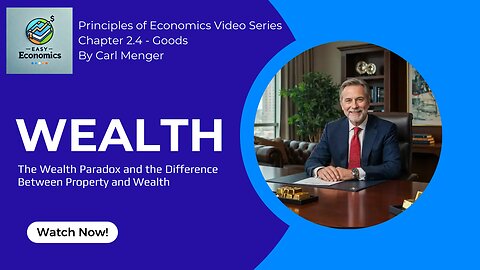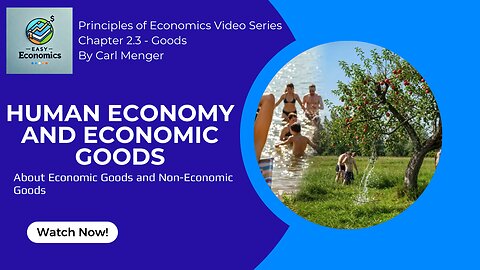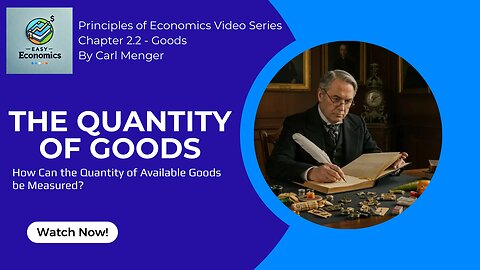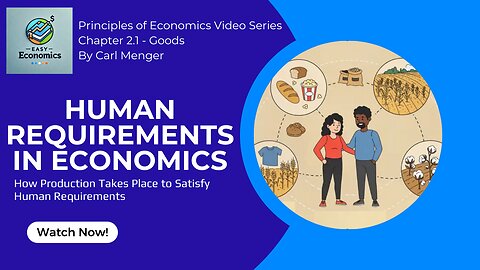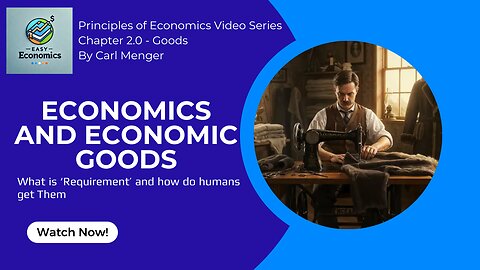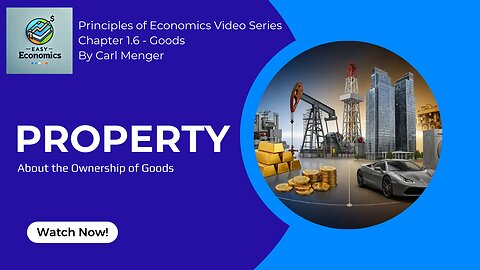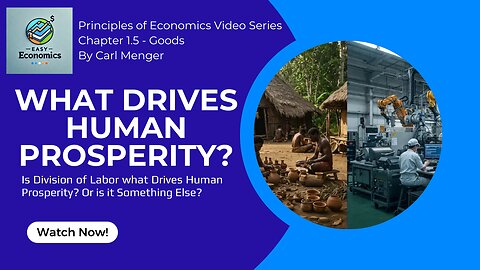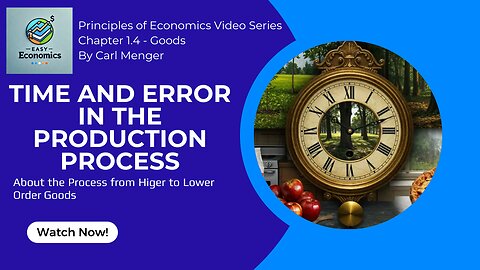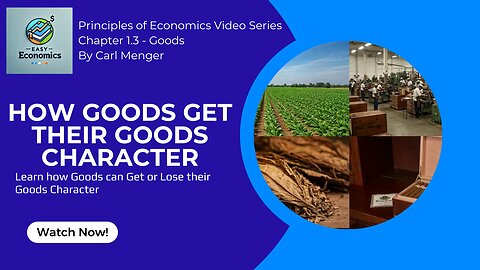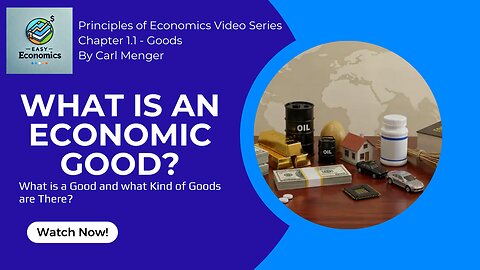Premium Only Content

Principles of Economics by Carl Menger Chapter 8.1 - The Nature and Origin of Money
Principles of Economics by Carl Menger Chapter 7.2C - Circulability of Commodities
Principles of Economics by Carl Menger Chapter 7.2B - Differences in Marketability of Commodities
Principles of Economics by Carl Menger Chapter 7.2A - Marketability of Commodities
Principles of Economics by Carl Menger Chapter 7.1 - What is a Commodity?
Principles of Economics by Carl Menger Chapter 5.3C - Competition Policy
Principles of Economics by Carl Menger Chapter 5.3B - Price Formation by Competing Sellers
Principles of Economics by Carl Menger Chapter 5.3A - Price Forming and Distribution by Competition
Principles of Economics by Carl Menger Chapter 5.2D - Principles of Monopoly Trade
Principles of Economics by Carl Menger Chapter 5.2C - Market Dynamics of Monopoly Pricing
Principles of Economics by Carl Menger Chapter 5.2B - Price Forming in Monopoly Trade for Quantities
Principles of Economics by Carl Menger Chapter 5.2A - Price Formation in Monopoly Trade
Principles of Economics by Carl Menger Chapter 5.1 - Price Formation in Isolated Exchange
Principles of Economics by Carl Menger Chapter 5.0 - The Theory of Price
Principles of Economics by Carl Menger Chapter 4.2 - The Limits of Economic Exchange
Principles of Economics by Carl Menger Chapter 4.1 - Foundations of Economic Exchange
Principles of Economics by Carl Menger Chapter 3.3E - The Value of Land, Labour and Capital
Principles of Economics by Carl Menger Chapter 3.3D - The Value of Individual Higher Order Goods
Principles of Economics by Carl Menger Chapter 3.3C - Combined Value of Higher Order Goods
Principles of Economics by Carl Menger Chapter 3.3B - The Productivity of Capital
Principles of Economics by Carl Menger Chapter 3.3A - What Causes the Value of Higher Order Goods?
Principles of Economics by Carl Menger Chapter 3.2D - The Subjective Nature of the Measure of Value
Principles of Economics by Carl Menger Chapter 3.2C - Influence of the Quality of Goods on Value
Principles of Economics by Carl Menger Chapter 3 2B - The Value of Goods for Individual Needs
Principles of Economics by Carl Menger Chapter 3.2A - Difference in Importance for Individual Needs
Principles of Economics by Carl Menger Chapter 3.1 - The Theory of Value
Principles of Economics by Carl Menger Chapter 2.4 - What is Wealth?
Principles of Economics by Carl Menger Chapter 2.3 - Human Economy and Economic Goods
Principles of Economics by Carl Menger Chapter 2.2 - Available Quantities of Goods
Principles of Economics by Carl Menger Chapter 2.1 - Human Requirements in Economics
Principles of Economics by Carl Menger Chapter 2.0 - Economy and Economic Goods
Principles of Economics by Carl Menger Chapter 1.6 - Ownership of Goods
Principles of Economics by Carl Menger Chapter 1.5 - Causes of Human Prosperity
Principles of Economics by Carl Menger Chapter 1.4 -Time and Error in the Production Process
Principles of Economics by Carl Menger Chapter 1.3 - The Laws that Govern Goods Character
Principles of Economics by Carl Menger Chapter 1.2 - The Causal Connection Between Goods
Principles of Economics by Carl Menger Chapter 1.1 - The Nature of Goods
Principles of Economics by Carl Menger Chapter 1.6 - Ownership of Goods
You want to read the book? Get it here: https://amzn.to/4cCPIQs
Watch the next video in this series: https://rumble.com/v6s8x31-principles-of-economics-by-carl-menger-chapter-2.0-economy-and-economic-goo.html
Watch the video series from the start: https://rumble.com/playlists/I48mBTB4w2c
Watch our video about Carl Menger: https://rumble.com/v61z0l2-carl-menger-the-father-of-austrian-economics-and-subjective-value.html
What does it really mean to own something? And why is ownership about more than just having stuff?
In this video, we explore Carl Menger’s powerful insight into property and the ownership of goods from Principles of Economics. Menger shows that real well-being doesn’t come from owning luxury goods alone—it comes from owning a balanced set of goods that together meet all essential human needs. Even someone living in a palace can suffer if they lack basic food, while someone in poverty still needs shelter and clothing to survive.
Goods don’t work in isolation. Their usefulness depends on how they complement one another. A coat is helpful only if you also have food and shelter. This interdependence becomes obvious in self-sufficient lifestyles, but it's just as real in modern economies—where trade masks the direct link between ownership and needs.
According to Menger, ownership is not random. The set of goods a person controls is structured to reflect their survival and well-being goals. Add or remove goods without understanding their role in that structure, and you risk destabilizing the entire system of support that person relies on.
By understanding ownership as a system—not a pile of assets—we gain a clearer view of how economics works on both a personal and societal level.
❓ Questions This Video Answers:
-Why is a single good useless without others to support it?
-What does Menger mean by the “ownership of goods”?
-How do needs determine what goods a person must own?
-Why can removing or adding a good cause harm?
-How does trade affect our perception of ownership?
00:00 - Introduction to Ownership of Goods
00:09 - Human needs
00:41 - Interdependence between Goods
01:00 - Modern Economics
01:28 - Sets of Goods
01:41 - Ownership of Goods
02:04 - Outro
#OwnershipEconomics #CarlMenger #HumanNeeds
-
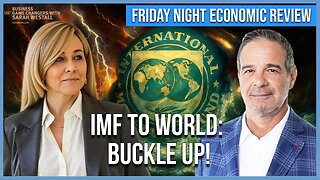 50:27
50:27
Sarah Westall
9 hours agoBig Banks Caught Rigging Market, IMF tells World to “Buckle Up” w/ Andy Schectman
48.3K22 -
 13:54
13:54
Degenerate Jay
16 hours ago $1.15 earned5 Best Superhero Movies To Watch On Halloween
26K5 -
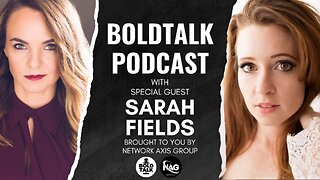 59:03
59:03
NAG Podcast
9 hours agoSarah Fields: BOLDTALK W/Angela Belcamino
44.9K10 -
 1:21:41
1:21:41
Glenn Greenwald
12 hours agoGlenn Takes Your Questions: On the Argentina Bailout, Money in Politics, and More; Plus: Journalist Jasper Nathaniel on Brutality and Settler Attacks in the West Bank | SYSTEM UPDATE #541
95.8K47 -
 3:10:08
3:10:08
Barry Cunningham
9 hours agoPRESIDENT TRUMP TO USE NUCLEAR OPTION? FOOD STAMPS END! | SHUTDOWN DAY 31
58K45 -
 1:06:56
1:06:56
BonginoReport
17 hours agoThe Battle Between Good & Evil w/ Demonologist Rick Hansen - Hayley Caronia (Ep.168)
107K39 -
 1:12:57
1:12:57
Kim Iversen
12 hours agoBill Gates Suddenly Says “Don’t Worry About Climate Change”?
95.6K70 -
 1:05:12
1:05:12
Michael Franzese
12 hours agoI Waited 50 Years to Tell You What Happened on Halloween 1975
48.5K20 -
 1:07:15
1:07:15
Candace Show Podcast
12 hours agoINFILTRATION: Charlie Kirk Was Being Tracked For Years. | Candace Ep 256
99K418 -
 9:17:19
9:17:19
Rallied
11 hours ago $4.26 earnedWarzone Solo Challenges then RedSec Domination
44.4K9
